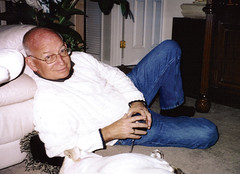Acute myelogenous leukemia (AML) is a malignancy that arises in either granulocytes or monocytes which are white blood cells that battle infectious agents throughout the body. AML is not inherited or contagious. It develops when there is a defect in the immature cells in the bone marrow.
The effects of AML are:
1) the uncontrolled, exaggerated growth and accumulation of cells called "leukemic blasts," which fail to function as normal blood cells, and
2) the blockade of the production of normal marrow cells, leading to a deficiency of red cells (anemia), and platelets (thrombocytopenia) and normal white cells (especially neutrophils, i.e. neutropenia) in the blood.
Acute myelogenous leukemia is the most common type of leukemia in adults, with an estimated 10,100 new cases of AML reported each year. Older people are more likely to develop AML than children. In fact, the risk for developing the disease increases about ten-fold from age 30 (1 case per 100,000) to age 70 (1 case per 10,000).
For years, my sister had loser men. Then along came Bud. A salt of the earth sort of guy. All around great guy. Loved by all. They've been together and happily married for quite some time now. In December of 2003, he fell ill. This is what he has. He went through a year of chemotherapy at the MD Anderson Cancer Center in Houston, Texas, traveling back and forth from Florida every month. He finished treatment in December of last year. The chemo forced him into remission and all seemed well and right on schedule. Last week he was tested and his red and white blood cell and platelet counts were too low. Too low, that, the doctors were quite alarmed. It didn't work, but without it, he wouldn't be here today. Since the chemo did not work, he is not eligible to take it again. This was a clinical trial for approval by the FDA with new types of drugs. The trial period is now over. They left for Houston on Sunday. There, the doctors will test him for leukemic blasts, which must have returned in order for his counts to be low, and to take bone marrow to test for a matching stem cell transplant donor. There are at least 2 suitable donors right now. His marrow will be killed through a massive dose of chemo, which is deadly in itself. Much stronger than the last procedure and highly toxic. If he survives this, and many don't, the doctors will proceed with the transplant. The greatest risk of the transplant procedure is the fear that the new donor cells will attack his organs. If this occurs, his organs will shut down. If it works, interestingly enough, his blood type will change forever to the donor's type. This is a risk he must take. He wouldn't survive without it anyway. He will be in total isolation for at least a month. They will have to move to Houston for a minimum of six months. All of his siblings have been tested as donors, but none are compatible. This is his last resort. It will either work or it won't. As it was when given chemo last year, his immune system will stop working and he will have to watch his diet and whom he comes into contact with. He is a very strong and brave man and has an incredible will to live.
We would all love to have him around for a long time. All I ask is that you have a kind thought or prayer for my brother-in-law, Bud Trexler and my sister, Maggie, who is also going through a very rough time right now.


No comments:
Post a Comment